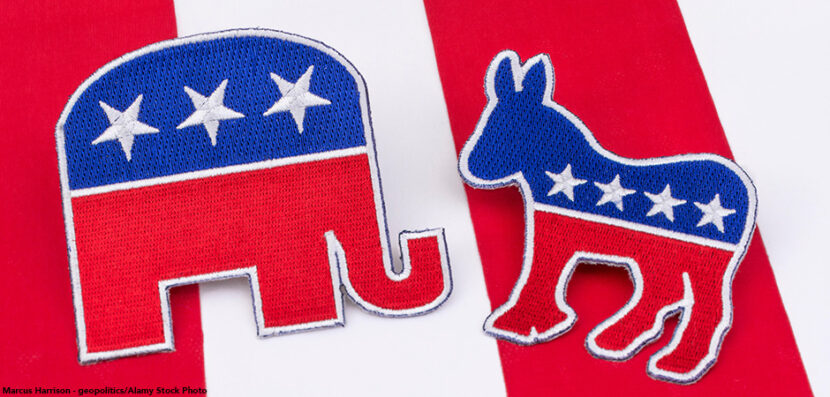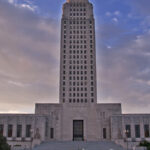- Current Events New Alabama Congressional District Selects Candidates
- Current Events Nebraska Rejects Winner-Take-All Proposal
- Citizenship Voting Under Age 18
- Citizenship Citizenship in Action
- Democratic Party Biden’s and Trump’s Recent Primary Results
- Elections Trump and Biden Win South Carolina and Michigan Primaries
Trump and Biden Win Big in Early February Contests
In early February 2024, both the Republican Party and Democratic Party held presidential primaries and caucuses. Former president Donald Trump easily won the Republican Party caucuses in Nevada and the U.S. Virgin Islands Likewise, President Joe Biden easily won the Democratic Party primaries in South Carolina and Nevada.
South Carolina Democratic Primary
South Carolina held the first official Democratic presidential primary on February 3, 2024. The Iowa and New Hampshire Democratic presidential primaries were held earlier but were not official contests. The Democratic Party decided to change the order of the primaries to allow for a more diverse set of voters earlier in the presidential primary process. White Americans make up around 90 percent of Iowa’s and New Hampshire’s population. South Carolina is more racially diverse. For example, African Americans make up around 26 percent of South Carolina’s population.
President Biden won South Carolina’s primary with more than 96 percent of the votes. The other candidates garnered few votes in the primary: Marianne Williamson earned 2.1 percent of the votes, and U.S. Representative Dean Phillips finished with 1.7 percent of the votes. Biden spent a lot of time campaigning in South Carolina leading up to the primary.
Nevada Primaries and Caucuses
Since 1981, political parties in Nevada held caucuses instead of primariesto choose presidential candidates. A caucus is a public meeting run by a political party to select a candidate. But in 2021, things became more complicated. The Nevada state legislature passed a law that requires the state to hold a presidential primary if there is more than one candidate running for a party’s nomination. Political parties may still elect to hold caucuses even though there is a state-run primary. This year, the state-run primary for both parties was held on February 6.
Nevada Democratic Primary
The Democratic Party decided not to hold a caucus and chose to select a candidate based on the results of the February 6th state-run primary. President Biden, Marianne Williamson, and eleven other lesser-known candidates were on the ballot. Voters could vote for one of these candidates or select “None of these candidates” on their ballot. President Biden won the primary with around 89 percent of the votes. Close to 6 percent of voters selected “None of these candidates.” Marianne Williams only received around 3 percent of the votes, and she dropped out of the Democratic presidential race following the loss.
Nevada Republican Primary and Caucus
The Nevada Republican Party used a caucus to award its delegates. However, per state law, Nevada still held a Republican primary on February 6th. The Nevada Republican Party decided that candidates on the primary ballot could not participate in the caucuses. Former Vice President Mike Pence, South Carolina Senator Tim Scott, and Nikki Haley chose to be on the primary ballot instead of participating in the caucus. Haley was the only candidate listed on the Republican primary ballot that was still running a campaign on February 6. Even so, she only received around 30 percent of the votes. Over 60 percent of voters selected “None of these candidates” on their ballot.
Most other Republican candidates–including Ron DeSantis, former New Jersey governor Chris Christie, North Dakota governor Doug Burgum, and Donald Trump–participated in the Republican Party caucuses on February 8. In the end, Trump won with over 99 percent of the votes because DeSantis, Christie, and Burgum had already ended their campaigns before the caucus was held.
U.S. Virgin Islands
The U.S. Virgin Islands are a U.S. territory. People born in the U.S. Virgin Islands are considered U.S. citizens but are not permitted to vote in a presidential election. However, the Republican and Democratic parties allow citizens in U.S. territories to have a role in choosing presidential candidates through caucuses.
On February 8, 2024, the Republican Party held caucuses in the U.S. Virgin Islands. Trump won almost 75 percent of the votes, and Nikki Haley, the only other candidate on the ballot, had a little over 25 percent of the votes. The Democratic Party will hold a primary in the U.S. Virgin Islands on June 8, 2024.
Looking Ahead
South Carolina will hold the next Republican primary on February 24th. Nikki Haley is a former governor of the state, so she is hoping for a strong performance against Trump. Some political analysts think she will drop out of the race if she does not win more votes than Trump in her home state.
Michigan will hold the next Democratic primary on February 27th. Only President Biden, U.S. Representative Dean Phillips, and Marianne Williamson are on the ballot. Williamson ended her campaign on February 7, so the race will be between Biden and Phillips. Political analysts predict President Biden will easily win the primary.



